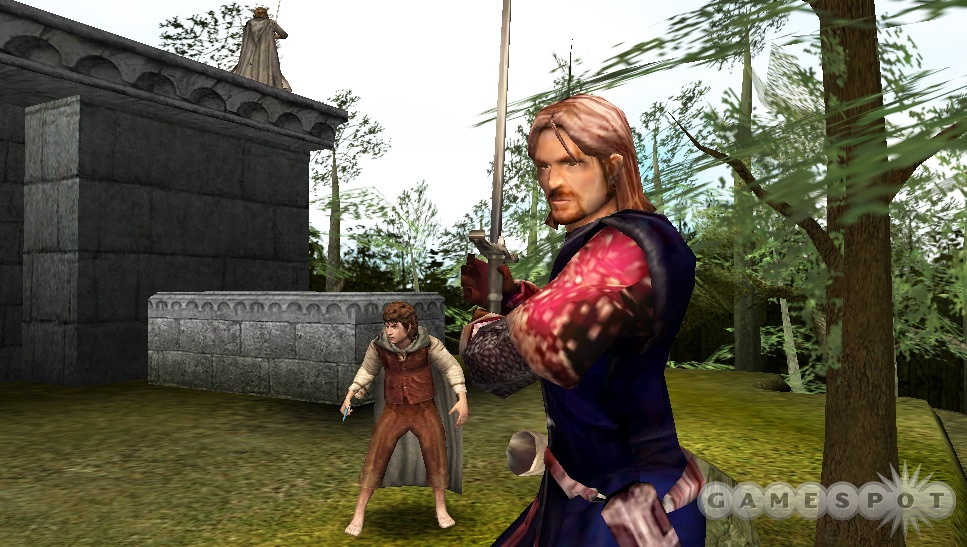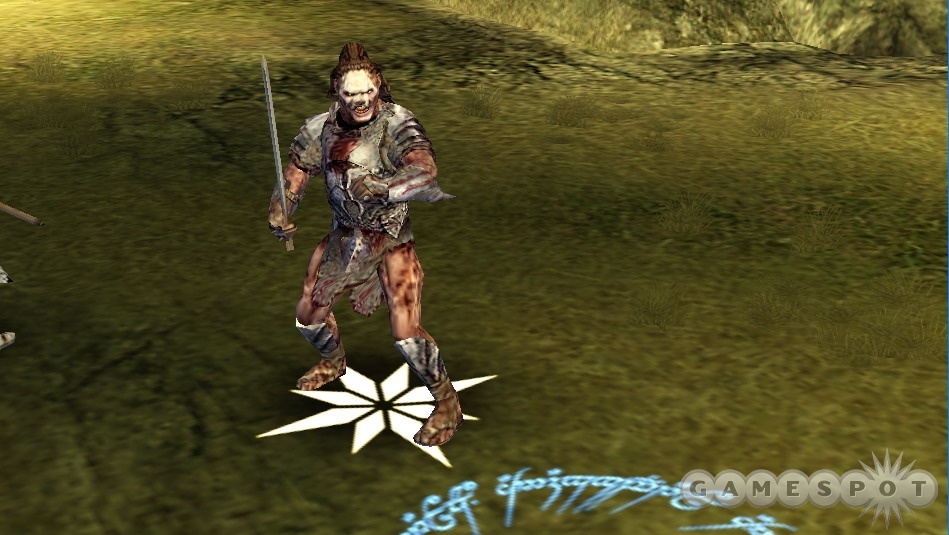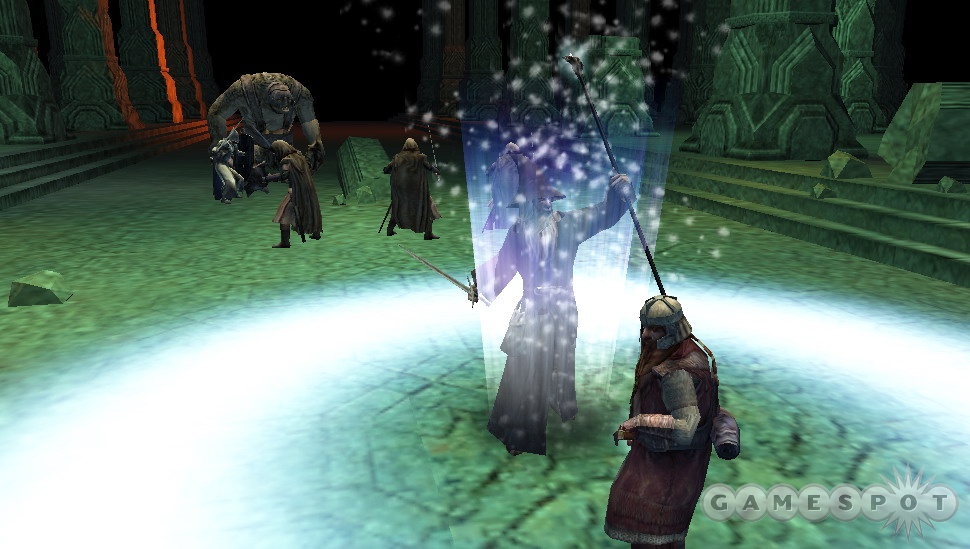It must have taken some careful planning and a lot of good luck for the decent people of Middle-earth to overcome the wicked military maneuverings of Sauron's armies. This conflict is abstracted down to a 3D turn-based strategy game in The Lord of the Rings: Tactics, which has a great concept and some good mechanics, but unfortunately, doesn't pull any of it off particularly well.

The Lord of the Rings: Tactics lets you play through a single-player campaign from the perspective of either the good guys or the bad guys of Peter Jackson's movie trilogy based on the J.R.R. Tolkien fantasy novels. A smattering of movie clips is used to introduce the campaigns and their missions, but because these are fairly disjointed and taken from source material that--let's face it--you've probably seen a whole bunch of times by now if you're interested in this game, the presentation of the story doesn't do much to draw you in. The actual plot of the movies serves only to loosely set up most of the game's battles, which will likely seem familiar to you despite them having taken some big-time liberties.
For example, both the Fellowship and Mordor campaigns begin with the fireside ambush by the ring wraiths against Frodo and his protector, Aragorn. The victory conditions of the battle are obviously different depending on which campaign you're playing. If you're playing as Mordor, all you're trying to do is give Aragorn a good beating. You can go ahead and kill Frodo while you're at it (hit him enough and the game confirms "Frodo has been slain!"), but don't worry, Mordor's campaign doesn't end right then and there as you might logically expect. The fact that hero characters on opposite sides are roughly balanced is also somewhat off-putting initially, since it means plump, untrained Sam Gamgee is capable of going toe to toe with Sauron himself. At any rate, this type of stuff, together with the game's decidedly rough-looking menus and somewhat confusing interface, conspires to make The Lord of the Rings: Tactics give a negative impression early on.
Thankfully, the gameplay itself has some interesting nuances, and for better or worse it deviates from the well-traveled formula found in most other strategy/role-playing hybrids. Rather than alternate turns with your opponent, turns are resolved simultaneously, but they're split into a separate movement phase and a combat phase. So during the movement phase, you tell all your units where to move on a gridlike map, and during the combat phase, you tell them whom to attack. When you're done queuing orders for a phase, you hit "go" and the actions are resolved based on the different combatants' statistical ratings (quicker characters act first). It bears mentioning that you'll never control more than a handful of units in a given battle, which keeps things manageable but also means this game doesn't begin to evoke the scale or intensity of the epic fight scenes from the films. On the plus side, you'll get to see most of the major and minor characters from the movies at some point, from the gangly Gollum on up to the massive, fiery balrog.

What adds some depth to the process is your hero characters' increasing assortment of special skills and items, as well as most units' ability to attack both when up close and from long range. The descriptions of the special skills make them sound much fancier than they appear but can be devastating regardless, such as ones that whittle down the enemy's armor and cause subsequent attacks to be far more damaging. Having multiple units focus their ranged attacks on a single target is another good way to quickly dispatch a foe. However, it's possible to prevent units from using their ranged attacks by engaging them in melee combat, which also may prevent them from moving during the next movement phase. Also, if multiple units surround an opponent, it suffers penalties to its armor rating to simulate the disadvantage of such circumstances. But since you don't know exactly what your opponent will do during the next movement phase, there's definitely some guesswork involved either in trying to pin down a defensive opponent or slow an aggressive one.
All this may sound compelling if you're into turn-based combat games, but The Lord of the Rings: Tactics doesn't execute on its design particularly well. The whole game has a sluggish, clunky feel to it, which would be crippling if there were any fast action involved, but instead just drags down the pacing. Turn-based games aren't necessarily meant to be ultrafast-paced or anything, but they shouldn't force you to sit around waiting for the fun stuff to happen. In this game, the rather dull movement phases and various, noticeable pauses during combat can wear on your patience.
As mentioned, the interface is also rather disappointing, since it doesn't do a good job of providing you with all the information you'd want at your fingertips. You can dig up the stats on a given unit on the battlefield, but the relative strength of two opposing units isn't made apparent at a glance. Unit pathfinding during movement phases is pretty wonky, too, since it can be difficult to make your units go where you want them to go when they're all in close quarters. The whole interface just seems incomplete, like a serviceable placeholder for something that could have been much better.

Meanwhile, the role-playing aspects of The Lord of the Rings: Tactics at once help make the game more engaging but also cut into whatever true strategy is required to accomplish a given mission. Units have a random chance to counterattack, block incoming strikes, or score critical hits, but these outcomes happen frequently enough to make the fighting seem a little too unpredictable for a game that's supposed to reward sound tactical decision-making. That is, you can play a battle multiple times while making roughly the same moves, and sometimes you might handily win, while at other times you might suffer a crushing defeat. That's assuming you're fighting against an equivalently powerful opponent.
Your hero units earn experience points between battles, and you also earn gold with which you can purchase new special abilities, better stats, and helpful items. Hero units become noticeably stronger as they gradually level up, which is satisfying, but the campaign's difficulty scales quickly enough to where this puts you at a disadvantage. You'll be pitted against higher-level heroes within just a few missions, and it'll take only a few ignoble losses to make you realize you won't win until you replay some earlier missions to level up and earn more gold. This forced repetition feels like a grind, bogging the pace of the gameplay down even further. At least you're freely able to replay missions whether you succeed or fail, though it might have been nice if the game rewarded you with at least a few gold pieces or experience points for your time and effort when you lose. Some missions really come down to the wire, so it can be disappointing to lose right in the home stretch. You do have the option to save your progress midmission, though.
The enemy artificial intelligence puts up a solid fight, and seems to understand the various scenarios' victory conditions. For example, in battles in which you're required to keep a certain character alive, sure enough, the computer opponent will go out of its way to bring that character down. There are some capture-the-flag matches, too, and in these the AI will either defend its flags or concentrate its attacks against yours, as the case may be. There's a reasonable diversity of maps and mission types, but the best missions are probably the most straightforward ones, where it's just a matter of kill-or-be-killed.
You've got three difficulty settings to choose from for the campaigns, and there's an ad-hoc multiplayer mode for up to four players, too. The simultaneous-turn-based combat may sound like it would lend itself fairly well to multiplayer, but in practice this isn't really the case; you'll still end up waiting around for the other player (or players), on top of just waiting around for the game. You also have to customize your unit selection each time you play, because whenever a match is over, you just get dumped back to the main menu without the option to have a rematch using the same settings. Getting to customize your army based on a finite point total is a nice touch, though. Still, the game's just more fun against the computer.

The Lord of the Rings: Tactics doesn't look like much, despite some nice death animations, decent lighting effects, and some almost-recognizable 3D characters. Seams in the textures, a frame rate that's sometimes slow enough that you can count it, and some dumb, obtrusive camera angles don't make for much eye candy. And the plain, empty menus don't help matters, either. From an audio standpoint, the game fares a bit better. Howard Shore's music from the movies is liberally used throughout, and units grunt and groan as they attack and take damage. Some of the interface noises are rather grating, though.
It takes a very tolerant Lord of the Rings fan to appreciate this game. While the memorable battle sequences from the movie trilogy would lend themselves perfectly to a strategy game, this one just isn't put together well enough to do full justice to the source material. But you still might want to check it out if you're itching for a PSP strategy game and need a way to kill some time while on the go.